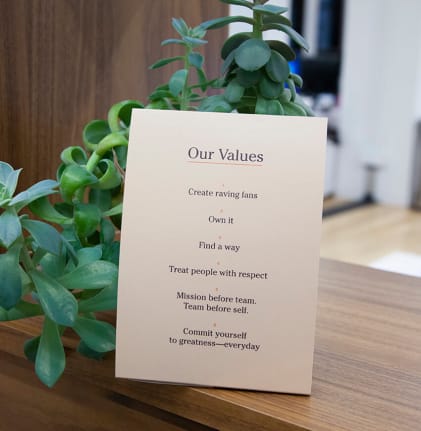
Building software for big decisions
There is over $1.5 trillion worth of home buying activity each year in the residential real estate market alone. That means there are countless opportunities to introduce efficiencies and economic value for home buyers & sellers.
We're looking for engineers that are passionate about building delightful customer experiences for both web and mobile, designing scalable architecture for our APIs & Operational Platform, and streamlining data processing across different data sources.
To help our customers buy and sell their homes, we’re creating and building products across three pillars: Consumer, Operations Platform, and Data Infrastructure.
View Open RolesCONSUMER
Build delightful user experiences
Our consumer-facing products are built to help buyers find their perfect homes, easily complete the financing and transaction process, and sell their current homes for top dollar. Many of the products we develop are true industry firsts, helping bring the real estate transaction into the 21st century.


As an engineer working on our consumer applications you will:
- Build unique, visually compelling products that reduce much of the stress of the innately stressful process of buying and/or selling a home
- Collaborate with our talented and experienced Design, Data, and Product teams to add innovative features to an exciting product that is rapidly expanding into new markets across the country
- Scale web services to handle exponential consumer traffic growth & optimize client-side performance for seamless user experiences
- Design reliable & secure systems which our customers can trust to manage sensitive data
- Rapidly iterate on business-critical conversion funnels through A/B testing
PLATFORM
The platform to orchestrate real estate transactions
In order to deliver a seamless experience to our customers, we need to reduce the complexity of end-to-end real estate transactions. The workflows to complete these transactions often span multiple roles and even businesses.


As an engineer working on our Platform team, you will:
- Develop business workflow features supporting multiple user roles ranging from real estate agents to our transaction coordinators
- Design data models + services to support scaling & new business verticals
- Create integrations with partners to maximize the types of services we can offer customers
Our Platform team deals with some of Orchard’s highest-leverage problems. This gives our engineers business domain exposure, ownership, and influence over how we shape the real estate industry for the future.
DATA INFRASTRUCTURE
Delivering value through data
Data is one of the essential product pillars at Orchard. We continuously improve our home valuation in order to deliver meaningful economic value to our customers. However, these models can only be as accurate as the quality and breadth of underlying data.

As an engineer working on data infrastructure, you will:
- Work with our data science team to productionize models on top of infrastructure that processes data across a range of sources and geographies
- Build and automate highly scalable, self-healing data processing systems that serve as the backbone of Orchard's multiple businesses and product lines
- Dive deep into the meaning of the data itself, discover potential use cases, extend Orchard's data platform, and offer new data models to product teams
Our team is eager to tap into new insights and unlock new data product capabilities. One example of past novel data productization? Our team created kitchen & yard photo search filters built on neural network image classification.
CULTURE
Tech Stack & Engineering Culture

Our services are developed, built, tested and deployed via Docker containers on Kubernetes. We've architected our services to be stateless and elastically scalable under different load conditions.
Orchard's engineering culture is centered around product empathy and autonomous teams with high feature ownership. Engineers take ownership of feature development end-to-end. This means we partner with Product Managers and Designers to solve ambiguous business problems and have a high degree of collaborative input before writing code.
We strive to keep common infrastructure and dependencies simple (or only as complex as necessary) to keep the coordination costs of infrastructure deployments low and support lean & nimble product engineering teams.
The interview process
Application
We’ll ask for your resume and a bit more information. Rest assured - we review every single application we receive. If it seems like you could be a fit for the role, a recruiter will reach out for next steps.
Recruiter Interview
This is a time for us to get to know you and for you to learn more about Orchard and the role. Your recruiter will guide you throughout the process so feel free to lean on them with any questions you may have.
Hiring Manager Call
You’ll meet with the hiring manager (usually the lead of the relevant team) to learn more about the role, and talk about your experience and aspirations.
Coding Exercise
We’ll set up a pairing exercise where you’ll code in a shared editor with an Orchard engineer. This step focuses on practical code that’s relevant to the role, not contrived algorithms.
Onsite Interviews
This stage consists of a few more interviews that will be in person or virtual depending on the role and your location, usually scheduled on the same day. You’ll meet more of the team as well as cross-functional partners.
References and Reverse Interviews
Now that we’ve made it through the skills assessment portion of the process, we use this stage to 1) ensure we can best support you should you join the team and 2) give you an opportunity to interview us.
Offer
Our personal favorite stage - this is where we can make things official and start preparing for your onboarding!
OPEN ROLES
Come join us in reinventing real estate
Don’t see the role you’re looking for?
Join our talent community to stay up to date on the latest opportunities at Orchard.